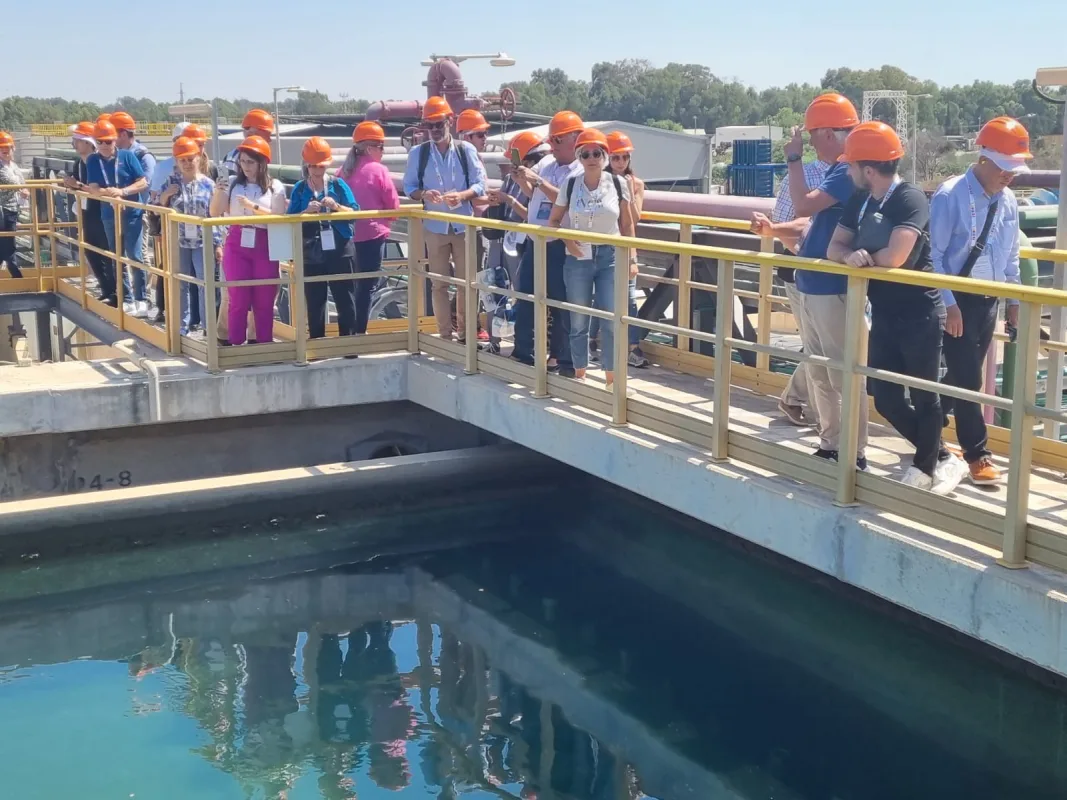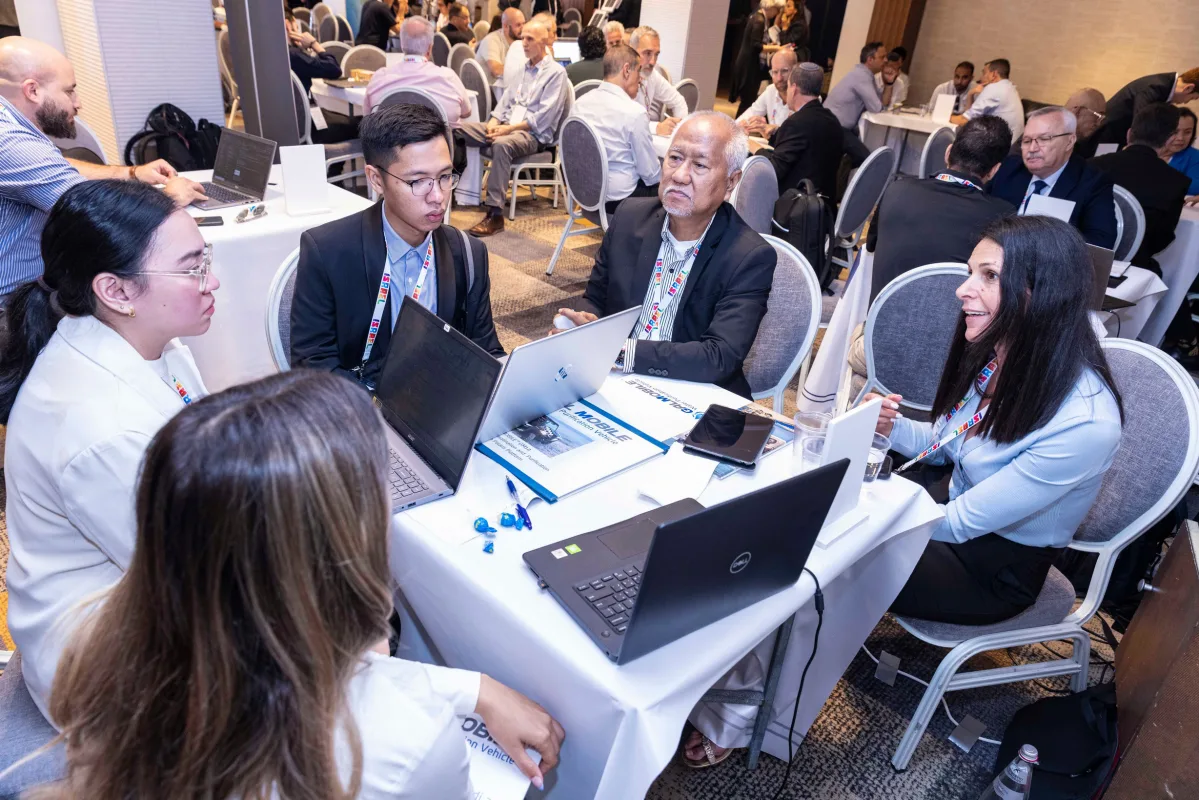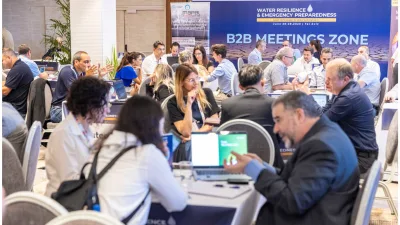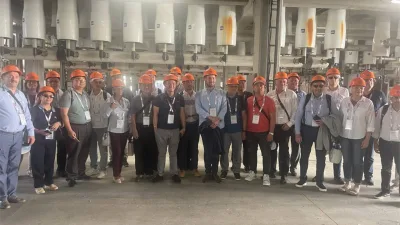By: Raphaele Moog

International guests of the event visiting the “Sorek” desalination plant.
Photo: Israel Export Institute PR
The world is currently experiencing a wide-scale water crisis. Fresh water lakes are drying up in Central Asia, extreme droughts are affecting North America and severe floods are occurring in Central Europe. The case of the Aral Sea in Central Asia reflects a grim reality. What was once a huge water lake, the fourth largest in the world, has almost completely dried up and on its bottom stands a rusty, deserted ship.
Recent research has determined, based on satellite photographs, that in more than 50% of the world’s largest lakes, the water level has receded due to the climate crisis, over-consumption of lake water and pollution. On the other side of the planet, California experienced, in 2022, the worst drought in 1,200 years. In the same year, the worst drought in 500 years was recorded in Europe. In addition, it became clear that rivers in the continent, which are used as major trade and shipping routes, are drying up and do not allow the passage of vessels.
A large part of the serious problems in the water sector is attributed to the climate crisis, but not exclusively. For example, the water and sewage systems in the cities of the world are aging and suffering from a considerable loss of precious water. And if that weren’t enough, the infrastructure systems in many countries are currently exposed to malicious cyber-attacks, whose aim is to disrupt normal life in the targeted countries. This reality, in which there are hundreds of thousands of attempts to sabotage and penetrate the computer systems of water companies and corporations every year, requires dealing with a complete set of solutions, including protocols and preparations for various scenarios prepared in advance.

Raphaele Moog
While the supply of fresh water in the world is decreasing, due to global warming, the demand for water is increasing by the day – for drinking, agriculture, and industry purposes. Demographic growth also takes its toll and requires finding more and more water sources, and the gap between demand and supply is growing. According to predictions, by the year 2050 one-third of the world’s population will suffer from severe shortage of water.
The answer to these problems lies in new water technologies, whose aim is of a dual nature, maybe even triple: to prevent water loss within the existing systems while monitoring for defects and leaks; promoting methods and processes for water recovery and seawater desalination, while making them cheaper and more economically viable; and the implementation of cyber protection systems in water and sewage facilities that are considered critical infrastructure.

B2B meetings at the event.
Photo: Israel Export Institute PR
A broad variety of advanced water technologies
These advanced technological solutions and many others were recently presented to buyers from 30 countries from four continents at an important international conference. This first of its kind event, held recently in Tel Aviv by the Israel Export Institute together with the Foreign Trade Administration at the Israel Ministry of Economy and Industry, the Israel Water Authority and in cooperation with the Manufacturers’ Association of Israel. The event was titled “WATER RESILIENCE & EMERGENCY PREPAREDNESS“, reflecting Israel’s desire to offer the world water technologies and water systems that face the many challenges in the water sector, as well as technologies that are immune to the climate crisis and cyber-attacks.

Israeli companies and international participants at a B2B meeting zone, as part of the event.
Photo: IEI PR
The participants in the conference included heads of organizations and executives in a wide range of positions: managers of companies and water corporations, integrators, consultants and managers of consulting companies, distributors, and managers of project management companies. In addition to lectures, round tables and professional discussions, the guests of the conference visited plants owned by water corporations, such as the water corporation of the city of Modi’in, located between Jerusalem and Tel Aviv-Jaffa; the large desalination facilities of Sorek (the largest desalination facility in Israel, operated by using the reverse osmosis [SWRO] method and supplying water of drinking quality to the national water system in Israel and considered to be one of the largest facilities in the world) and Palmachim (that operates using the same method). Last but not least, the participants visited the Shafdan Plant, that carries out complete recycling and purification of all the sewage of cities in the Tel Aviv metropolis.

Reverse osmosis at the “Sorek” desalination plant. Photo: IEI PR
The participants also visited the National Cyber Headquarters in Be’er Sheva, which consolidates the government’s activities in the cyber field, thanks to fruitful cooperation between the government, academia, industry, and the military. The National Cyber Headquarters is where the Israeli Cyber Emergency Response Team (CERT IL) operates as well, which also includes a control center for environmental protection.
Furthermore, the participants were shown a wide variety of advanced water technologies, such as monitoring water quality using AI; an acoustic method for detecting leaks; and cyber protection of water systems and water corporations.
In conclusion, technological solutions for efficiency, utilization, recycling, desalination, and the loss of water, along with cyber protection of infrastructure facilities, are needed today more than ever to cope with growing challenges in the water sector. Israel is considered one of the most advanced countries in the fields of water and cyber, and it currently offers its accumulated knowledge and experience to many countries in the world, as part of the global effort to deal with humanity’s most urgent challenges, including the lack of water.
The writer is the Head of the of the Water Technologies sector at the Israel Export Institute

For More Information: https://export.gov.il/en



